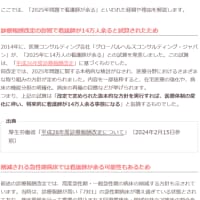
What is important in psychiatric nursing training is not to directly improve mental symptoms.
子育て中、過干渉・過保護にならないために https://www.shinga-s-club.jp/column/%E5%AD%90%E3%81%A9%E3%82%82%E3%81%AE%E8%87%AA%E7%AB%8B%E3%81%B8%E7%9B%B4%E7%B5%90%E3%80%82%E5%AD%90%E8%82%B2%E3%81%A6%E4%B8%AD%E3%80%81%E9%81%8E%E5%B9%B2%E6%B8%89%E3%83%BB%E9%81%8E%E4%BF%9D%E8%AD%B7/』
What is important in psychiatric nursing training is not to directly improve mental symptoms.
The challenge is how to restore the humanity of people whose autonomy has been taken away by forced medical treatment without the consent of the patients, known as "psychiatric drug therapy" or "closed treatment."
It is unknown how much of a person who has lost their autonomy and independence can be restored in the two weeks or so that nursing students will be in charge of them, but in psychiatric nursing training, students are taught with the hope that they will understand "what is life?" and "the importance of autonomy and freedom."
Humans are creatures who live in society.
When we talk about society, we mean when two or more people gather together, it is called a group or society.
Society needs rules and morals.
Without these two things, order cannot be maintained and society will collapse.
"I want to live on a deserted island. I don't have to work or study at school."
Some people say this.
In a sense, a deserted island is free, but there is no electricity or internet, so you can't use a smartphone, and you have to live a self-sufficient life.
In exchange for losing convenience, you gain freedom.
Convenience can also be described as "time."
In modern society, home appliances have rapidly developed and become more convenient, so housework no longer takes up much "time."
However, many people do not know how to use their time, and waste it by lazily looking at their smartphones, gambling with pachinko or drinking alcohol.
When admitted to a psychiatric hospital, they are told that "following the ward rules is part of the treatment," and are forced to restrict their lives in various ways.
There are restrictions on valuables and possessions, razors and earpicks are considered dangerous items and cannot be managed by the patient, and they are not allowed to bring smartphones or computers, and they live a life full of restrictions that would be unthinkable in the general society.
In addition, they are told that it is necessary for treatment, and there are restrictions on communication with the outside world, such as "restrictions on going out and visiting."
(Since the COVID-19 outbreak, people have been restricted from going out as a measure against infection, and they are still forced to live a cramped life.)
They have to spend their time in the hospital without any personal belongings other than their clothes, so they have no entertainment. (They are also prohibited from owning a belt.)
"I have free time, but I have nothing to do."
Inevitably, due to the fatigue caused by the psychotropic drugs and the muscle stiffness caused by the extrapyramidal symptoms, they spend most of their time in bed all day.
The ward staff interpret this state as "the medicine is working, and I'm sedated, so my mental state is calm," "It's thanks to the medicine,"
or "It's a negative symptom, which is one of the typical symptoms of schizophrenia,"
and express it as an "effect of the disease," but in reality it is a side effect of the treatment.
By having their belongings and range of movement restricted, they are no longer able to "manage their time" by themselves.
In a sense, they are deprived of their freedom to connect with society and to have limited tools to improve their own abilities.
Let me give you an example.
Imagine an overprotective parent.
"My child will be bullied if he goes to school."
"If he goes outside to play, he will be in a traffic accident."
What would happen if the child was forced to stay at home?
The child's ability to be independent, that is, to think for himself, act for himself, and take responsibility for the results, will not develop.
Humans do not develop independence unless they are given a certain amount of freedom.
On the other hand, by restricting freedom, it is easy to take away independence.
And once independence is taken away, it is difficult to get it back.
In sports, moving your body every day through practice allows you to perform well in real games.
If you suddenly start exercising just because "you used to do it," you will tear muscles and damage ligaments.
The human brain is the same. If you suddenly try to become independent, the brain will become fatigued and injured, causing depression and a loss of motivation.
What is needed in psychiatric rehabilitation is "freedom."
Freedom not to take medicine, freedom to go out, freedom to manage money.
(Kazuo Okuma also used this title in his book)
"If I make them manage themselves, they will spend it all by the end of the month, and if I let them go out freely, I will cause trouble for the local people and they will look down on me."
If you think like that, you will never develop a sense of independence.
This is the same as a parent who keeps their child locked up at home because they are "bullied" or "afraid of accidents."
In life, it is important to "prepare and try." If you fail, you can just "think about it after you fail."
And "failure is an experience."
Social hospitalization and institutionalization are the result of overprotection.
Because medical care only manages risks, it creates overprotection and creates social hospitalization.
General emergency doctors can sedate patients during the acute psychiatric phase, and neurology can take care of the recovery phase.
And relationships with families and the community should be handled by the government and welfare organizations.
It's outdated to label troublemakers with a disease and lock them away.
I believe that the role of psychiatric hospitals in the future will be to function as self-support facilities, helping people find employment, return to society, and become independent. This is the role of welfare, not hospital medicine.




















※コメント投稿者のブログIDはブログ作成者のみに通知されます